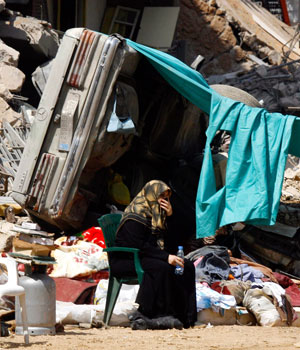
A Lebanese woman sits next to her home, which was damaged during the recent conflict between Israel and Lebanon’s Hezbollah, in a southern suburb of Beirut, August 24, 2006 (REUTERS)
BEIRUT, (Reuters) – About 150 French soldiers joined U.N. troops in Lebanon on Friday as Kofi Annan voiced optimism he would raise 15,000 troops from Europe and elsewhere for the force that aims to protect a truce between Israel and Hizbollah.
European and other nations had been dithering over how many troops to dispatch on the potentially hazardous mission, despite prompting from the United States and others.
“I am very confident that … Europe will assume its responsibility and show its solidarity with the people of Lebanon,” the U.N. secretary-general said before emergency talks in Brussels with the European Union’s 25 foreign ministers.
Italy has offered up to 3,000 troops and France boosted its pledge to 2,000 on the eve of the meeting. Belgium pledged an “important participation” in the force on Friday. Other possible troops contributors include Spain, Poland and Finland.
The French soldiers who arrived by ship in the southern port of Naqoura are part of France’s initial offer of 200 extra soldiers.
Around 50 French troops arrived last week.
Finland, which will chair the talks as the EU’s current president, insisted the bloc’s credibility was at stake and that it must show it can deploy rapidly to protect a fragile truce.
“The main thrust of the force should be there within a few weeks because every day there is a risk that the ceasefire could unravel,” said Finnish Foreign Minister Erkki Tuomioja.
U.N. officials see a strong European contingent as vital to the balance of an expanded peacekeeping force, known as UNIFIL, which will also have a strong Muslim component. It is set to have up to 15,000 troops and to work alongside a similar number of Lebanese soldiers in the south.
The U.N.-backed truce took effect on Aug. 14 after 34 days of fighting which cost the lives of nearly 1,200 people in Lebanon, mostly civilians, and 157 Israelis, mainly soldiers.
President Jacques Chirac, who disappointed allies by initially offering only to double an existing French contingent to 400, said France would increase its deployment after winning assurances they would be able to defend themselves robustly.
U.S. President George W. Bush hailed the new French offer.
“This is an important step toward finalising preparations to deploy the United Nations Interim Force of Lebanon,” he said.
Israel wants the beefed-up U.N. force to deploy alongside the Lebanese army before it withdraws fully from Lebanon. It also has vowed to keep its partial sea and air blockade on Lebanon until the force is monitoring the border with Syria.
Lebanon said on Thursday it would seek technical assistance from Germany to help control the border with Syria, but had no immediate plans to ask UNIFIL to deploy soldiers there.
Syria threatened a day earlier to close the border if U.N. troops were sent there.
In a sharp public rebuke over his handling of the war in Lebanon, a poll published on Friday showed 63 percent of Israelis want Prime Minister Ehud Olmert to resign.
The Yedioth Aronoth poll showed for the first time a majority favoured Olmert quitting, along with a surge in support for the rightwing Likud party and its leader Benjamin Netanyahu.
Another poll in Maariv newspaper showed only 14 percent of Israelis would vote for Olmert if new elections were held today, while 26 percent would back Netanyahu, a former prime minister.
The Yedioth poll said 45 percent would support Netanyahu as prime minister in new elections.
Yedioth, Israel’s biggest circulation daily, called the poll a political “earthquake” for Olmert, whose centrist Kadima party crushed Netanyahu’s Likud in March elections. A similar survey a week ago showed 41 percent wanted Olmert to resign.
Olmert, a career politician who lacks the combat credentials of many of his predecessors, has seen his public standing plummet for failing to deliver a fatal blow to Hizbollah.
Israel has also pursued an offensive against Palestinian militants in the Gaza Strip, where hospital officials said eight people were wounded on Friday in air strikes on the home of a Palestinian militant and what the army said was a weapons depot.
The Israeli army has been trying to force the release of an Israeli soldier seized by militants from Gaza on June 25.
There has been no word on the fate of Corporal Gilad Shalit, but the Hamas-led Palestinian government said progress was being made towards the release of a Fox News correspondent and camera man seized by gunmen in the Gaza Strip on Aug. 14.
“Things are going in a positive direction,” Palestinian Interior Minister Saeed Seyam said, but gave no details.

A Lebanese woman grieves over the coffin of a family member removed from a mass grave and draped with the Lebanese national flag in the southern port city of Tyre, Lebanon, August 24, 2006 (AP)

French troops disembark in the southern Lebanese port of Naqura, 25 August 2006 (AFP)
